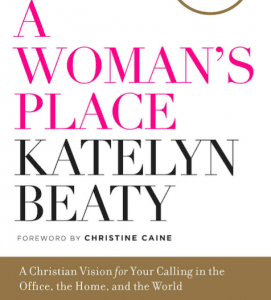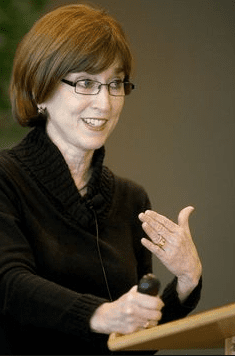 Somehow, someway, affirm women today, pastor. From the pulpit.
Somehow, someway, affirm women today, pastor. From the pulpit.
Here’s a post from Becky Castle Miller on Things Women Need to be Hearing in Church.
Last week, Scot shared a post from Arise about the hashtag conversation around Sarah Bessey’s #ThingsOnlyChristianWomenHear. (Link: http://www.patheos.com/blogs/jesuscreed/2017/04/21/things-christian-women-hear-women/)
The Twitter conversation generated much conversation in the Christian blogosphere and publishing world. The hashtags #ThingsBlackChristianWomenHear and #ThingsOnlyBlackChristianWomenHear offer further important insight into prejudice in the church.
As I read the #ThingsOnlyChristianWomenHear tweets and shared some of my own, I felt heavy-hearted for my sisters in Christ and the ways we have been silenced and marginalized in our churches. It’s such a common experience. Look at this poll:
Have you ever felt that being a woman made you less important in the Kingdom? #ThingsOnlyChristianWomenHear #ThingsChristianWomenShouldHear
87%Yes
08%No
04%Yes -by my father/husband
01%No – men have empower me
Suddenly I started seeing, mixed in to the Twitter talk, some beautifully encouraging messages with the hashtag #ThingsChristianWomenShouldHear. Thanks to the idea by Bronwen Speedie (@GodsDesignPerth), people were offering ideas for how churches can support women who have been hurt by misogyny. This tweet summed up how I felt about the two hashtags:
#ThingsOnlyChristianWomenHear—accurate. harmful. heartbreaking. #ThingsChristianWomenShouldHear—accurate. healing. heart mending.
I jumped in with this:
Becky Castle Miller @bcastlemiller
“Junia has been silenced long enough!” –@scotmcknight #ThingsChristianWomenShouldHear
I was amused that someone responded and tried to argue about the female apostle with Scot, who literally wrote the book on Junia. ***ADD LINK
Here’s a collection of some of my favorite tweets of what Christian women SHOULD be hearing.
Apologies
#ThingsChristianWomenShouldHear I’m sorry.
I’m sorry for how the church has sidelined women #ThingsChristianWomenShouldHear
Angie Sanderson @AngieKSanderson
“We regret giving platform to celebrity pastors who spoke disparagingly abt women.” #ThingsChristianWomenShouldHear
“Your hurt and anger make so much sense. I wouldn’t want to be excluded, silenced, or insulted either.” #ThingsChristianWomenShouldHear
Your mental illness is not the result of failing to submit to authority– male, god-given, or otherwise. #ThingsChristianWomenShouldHear
Encouragement
“You bring things we desperately need. Join us, lead alongside us, be you, we will be richer for it.” #ThingsChristianWomenShouldHear
“I am willing to do whatever I can to help you more fully live into your calling, giftedness, and passion.” #ThingsChristianWomenShouldHear
Chris Roberds @differentpastor
Your gifts, leadership, passions, sermon, & heart helped me look like Jesus today. Thx for preaching. #ThingsChristianWomenShouldHear
#ThingsChristianWomenShouldHear Your words are worth listening to, your wisdom is important, your participation in Xian life & Mass matters
Andrew Norton-Thorne @AndrewNorThor
The first Xn messenger of the risen Christ was a woman. You follow in worthy footsteps. Be brave. #ThingsChristianWomenShouldHear
How can we bless your family while you are seminary? #ThingsChristianWomenShouldHear
Theology
Angie Sanderson @AngieKSanderson
“We apologize for contorting the Trinity to bolster the ‘biblical manhood & womanhood’ movement.” #ThingsChristianWomenShouldHear
We may disagree on our interpretation but I trust that you are seeking God as earnestly as I am.
We understand that we also serve the God of Sarah, Rebecca, and Leah. #ThingsChristianWomenShouldHear
Gender roles
St. Simeon the Fool @SimeonTheFool
Don’t you know what Ephesians 5 says? It says I need to submit to you. #ThingsChristianWomenShouldHear * Yes. Really. Verse 21. Look it up.
#ThingsChristianWomenShouldHear your identity is not rooted in marriage or motherhood. Gentleness isn’t just for women.
Your husband’s cookies were to die for at the church’s potluck on Sunday!#ThingsChristianWomenShouldHear
“Why don’t you ask that nice guy from church out for coffee?” #ThingsChristianWomenShouldHear
Ministry work
We’ve got nursery covered, so maybe you’d like to speak on the topics you’ve researched for ten years. #ThingsChristianWomenShouldHear
Elizabeth Hagan @elizabethagan
You’re a great speaker & teacher. You should go to seminary. We can’t wait to ordain you &hire you to preach #ThingsChristianWomenShouldHear
I have no problem meeting in the children’s room so your kids can play while we discuss your ministry. #ThingsChristianWomenShouldHear
Being approached after your sermon by a junior high girl: “I want to be a pastor one day, too.” #ThingsChristianWomenShouldHear
“We’re so glad to have you here. You bring a much needed POV to the table.” #ThingsChristianWomenShouldHear
Thank you for your emotional and physical labor, in building and caring for Christ’s church. #ThingsChristianWomenShouldHear
I’m the pastors husband, glad you’re visiting our church today! My wife always brings a good word! #ThingsChristianWomenShouldHear
Daniel Hopkins @danielmhopkins
This is me. My wife is a wonderful pastor. I’m her greatest supporter, and incredibly proud of her. #ThingsChristianWomenShouldHear
We don’t think we are paying you enough…any female employees of #church #ThingsChristianWomenShouldHear
You are an amazing leader! Let’s add you to the senior ministry team. #ThingsChristianWomenShouldHear
We’ve been praying, and would like you to consider becoming an elder #ThingsChristianWomenShouldHear
#ThingsChristianWomenShouldHear Martha 1st to declare Jesus Messiah. Mary Magdalene 1st to proclaim him risen. Sister you go out & preach!!!
Abuse
We believe you when you said you were abused. It’s not your fault. It’s the abuser’s fault. #ThingsChristianWomenShouldHear
“I’m sorry for what you were told by the church. That is spiritual abuse.” #ThingsChristianWomenShouldHear
We called the police. #ThingsChristianWomenShouldHear
Being raped and abused was not God’s plan for you. What do you need from the church to help you heal? #ThingsChristianWomenShouldHear
I believe you. I’m sorry our Pastor sexually abused you. It’s not your fault. He is no longer in leadership. #ThingsChristianWomenShouldHear
What do you think Christian women should hear?
#ThingsChristianWomenShouldHear was everything I didn’t know I needed to hear. It’s like I was holding my breath and now I can breathe.

















